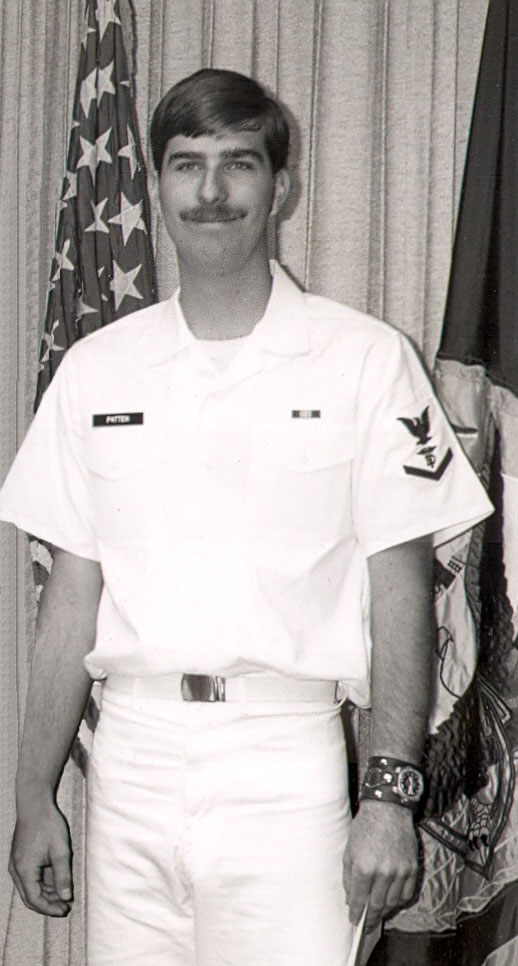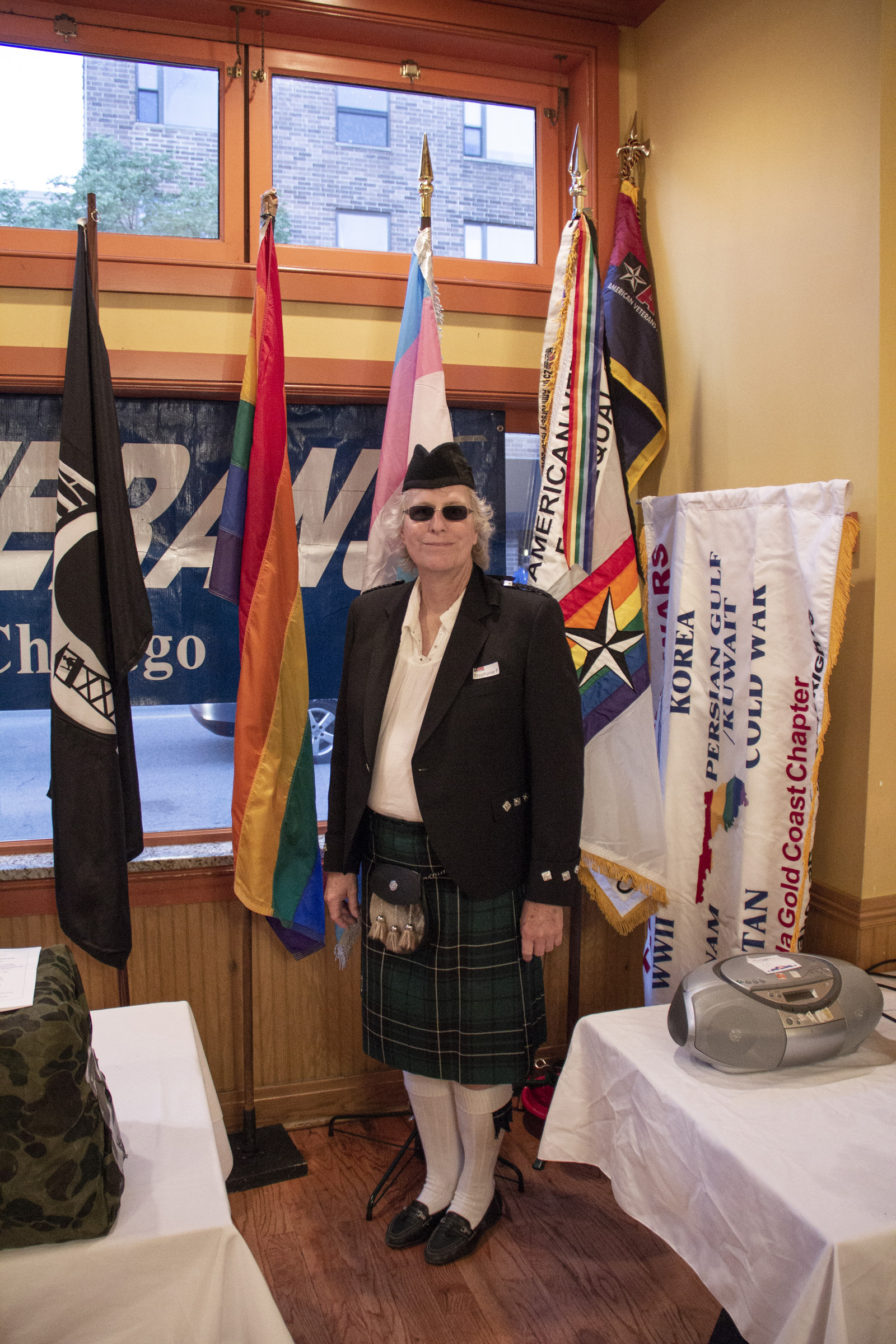
STEPHANI PATTEN (Navy, E5) - "Life is an Evolution"
Life as an evolution from one state of being to another, and another….
That’s the philosophy that former Navy dental prosthetic tech Steve Patten (as he was then known) espouses; that’s the life that he has lived as a male transitioning (evolving) to female decades later.
The Albuquerque native evolved as a boy in a normal though challenging childhood following the drowning death of his older brother; through high school; and two years at the University of New Mexico (UNM). That is when he realized he needed to do something else. Steve enlisted in the Navy in 1972. “I realized I was gay when I was a student at UNM. Going to the military was a way to prove that I wasn’t gay, or so I thought. That didn’t work, as it turns out,” he said during this interview.

MILITARY SERVICE: As a male, he served three years on active duty and three years in the Naval Reserves, exiting as an E5. He served both active duty and in the Navy Reserves in San Diego. His military record was exemplary. He scored high on the Armed Services Vocational Aptitude Battery (ASVAB) and trained to do dental assisting and make dental restorations (such as crowns). He graduated in the top 1% in A and C schools. He supported the Seventh Fleet at the Naval Regional Dental Center, as well as Balboa Naval Regional Hospital, serving at the time when Vietnam Era veterans were returning home. “We saw a lot of Vietnam vets, many needing facial reconstruction following injuries in the field.” He left active duty as an E4, dental prosthetic technician.
“I entered the Navy to see the world, but the Navy said I did so well that they wanted to keep me in San Diego. I had a really cushy job, though – I worked eight to five, Monday through Friday. My Navy experience was different than most. I was never aboard a ship, but I would ride with shore patrol once a month,” he recalled during the interview. He worked in a premier dental lab by day. At this time, Steve met his first gay lover.
In the Reserves (1975-1978), he was attached to a Sea Bee Heavy Equipment Maintenance Battalion (CBMU-303) in San Diego. He was promoted to Petty Officer Second Class (E5). “We worked on tanks and heavy equipment. My CO told me I would have two jobs: I’d handle public relations daily and when we went on maneuvers, I’d be a medic. So I got medic (field medical) training. I felt like I was in MASH. Medical challenges were sprained ankles and other injuries due to normal body wear and tear.”
“The Sea Bee unit was attached to a Fleet Marine Force unit and was on standby for deployment to Vietnam and other “hot spots” around the world. During this time, I honed my medical knowledge and skills, learned how to build things and how to participate in a unit during war time. There was much war game involvement at Camp Pendleton,” he
recalled. “It had airy beachheads, so we did beach landings with crafts coming in during joint exercises with the Navy and Marines. We did a massive landing on a small beachhead and then funneled under Interstate 5. That was a completely different experience. As a corpsman, I never carried a rifle; we used a .45 caliber pistol. It was intense in summer camp. My job was to make sure that we had all the supplies we’d need if we were to get called up.”
What was he looking for at the time? He didn’t know. He’d taken dental lab experience as far as he could go. He thought about making a career in the military in 1978, but when getting ready to leave the military, he realized, “I was a gay man. I would have loved to have made it a career. Being in 20 years, you get a military pension; but I was frustrated and disappointed that I couldn’t be who I was at the time. When I’m at work, I do a professional job. My private life is my business. I don’t bring it into my work. But it was disappointing. On the other hand, there were seven of us in the military dental lab – four lesbians and three gay men. We supported each other.”
POST-MILITARY LIFE: Steve (as he was still known) earned a bachelor’s degree in information systems, graduating cum laude, and a master’s degree in business administration from National University. Life continued to evolve. He held several jobs in a few states with two different partners as Steve continued to question his sexuality. He moved back to Albuquerque in 1992, then to Texas and to Florida. In Albuquerque, he started his own business, got a contractor’s license and a real estate broker’s license. He did home remodeling as a one-man shop, adding subcontractors when more people were needed to compete a job. He and his partner moved to Texas in 2000, then to Florida, where life got more complicated. His partner could not deal with Steve beginning the transition from male to female while living there. “In the late 1990s-2000s, transition issues came up for me. I thought that’s what I must be,” he said. Steve was left with significant debt and came close to homelessness.
He moved back to Albuquerque and tried to continue transition but soon was diagnosed with Hepatitis Type C. Eighteen months of chemotherapy took a lot out of Steve. He had been denied social security disability after the hepatitis diagnosis and the chemo. He appealed with the help of an attorney and was approved at 100% disability. He did not apply for VA benefits because his illness was not related to military duty.
Health issues persisted. After chemo, Steve was able to continue hormone replacement therapy (HRT) for another 18 months. Transition was complete in 2005. This included changing his name from Steve to Stephani and using the “she/her” pronouns. Then an autoimmune disease (lupus) attacked her body, forcing her to end the HRT because estrogen feeds lupus. She has been off HRT since 2011.
Since then, Steph helped her parents live at home through the end of their lives. She eventually moved back into his childhood home. She loves the comfort of living there. She still suffers from low energy and, now in the summer, the heat.

Pres of NM Chapter of AVER
Her major focus for the past two decades has been advocating for LGBT+ rights, especially for those in the military. She serves as president of the state chapter of AVER, American Veterans for Equal Rights – formerly called Gay, Lesbian and Bisexual Veterans of America. “I didn’t want to do anything with veterans until I met other veterans in AVER,” Steph admitted. “Now, it consumes my life and I love it. Here is a group that I can accomplish things with. A big part of what we do is advocacy with our elected officials, education, resource referrals, and a deep sense of camaraderie.
“We have created a major presence for AVER in the annual Albuquerque Pride parades from 2008 to the present. We are making a difference. I am proud of that.”
To learn more about AVER, check out the state chapter website and the national website. Also read the sidebar article where Steph chronicles the legal victories for the LGBT+ community and identifies the work that still needs to be done.
THOUGHTS ABOUT THE MILITARY: Having lived as a gay man in the military and transitioning to a female later has given Steph a perspective on both the value of military service and the issues that continue to affect LGBT+ service people and veterans.
- “I’m a firm believer that every high school student in our country should give two years of any kind of service to our country. This could be the military or organizations like AmeriCorps or the Peace Corps, or something similar. They would learn more about responsibility and commitment, about life skills, and what it means to have a job. They would also learn to respect authority,” she said.
- “In the last decade, young people have shown little respect for veterans and for the military. When we were kids, a lot of our grandparents and parents passed on the importance of being in the military. Our country has lost that perspective,” she concluded.
- “It’s a whole different world now – “don’t ask, don’t tell” was enacted in 1993 after I left the Navy. Since then, it was repealed in 2010. I don’t know how the gay and trans community handles it now. I’ve read that there is still a lot of shielding personal life in the military. I just know that I would be careful about what I say at work,” she said.
Steph’s life continues to evolve in this whole different world. “There is much work yet to do. I am committed to improve life for our LGBT+ friends in the military, those who are veterans, and all who try to survive in this time of uncertainty, this time where legal protections due to marginalized communities are in jeopardy,” Steph concluded.
Thoughtful and interesting column. Thanks, Steph and Sue.